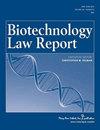新冠肺炎背景下中国实施强制性药品专利许可的挑战与应对
IF 0.2
4区 生物学
Q4 BIOTECHNOLOGY & APPLIED MICROBIOLOGY
引用次数: 0
摘要
新冠肺炎疫情在中国和世界范围内迅速蔓延。根据世界卫生组织的说法,这是一个具有全球意义的突发公共卫生事件(世卫组织)。控制药物供应至关重要,因为这种危险的大流行病已严重危及全球公共安全。本文从新冠肺炎疫情的现状入手,分析各国对药品专利强制许可的要求,指出中国药品专利强制许可存在的问题,最后提出实施药品专利强制许可的可行性建议。中国和世界其他地区都经历了Covid-19的快速传播。据世界卫生组织(WHO)称,目前存在国际突发公共卫生事件。中国大多数制药公司成立时间较短,目前生产的都是山寨药。政府需要正确理解强制专利许可制度的价值,并提供必要的支持,以确保其成功推出。政府可以实施具体的政策,增加药物开发专项资金,向制药公司提供贷款,聘请合格的人员进行药物研发,总体上加强中国的制药工业。制药公司是强制专利许可制度下的药品制造商。制药企业要发展综合实力,提高药品生产能力,有足够的资源满足社会需求,保障公众健康安全。为了提高发展速度,必须促进国际合作,积极引进国外创新系统和工业设施。本文章由计算机程序翻译,如有差异,请以英文原文为准。
China's Challenges in Implementing Compulsory Drug Patent Licenses and its Response in the Context of COVID-19
Covid-19 has spread quickly throughout China and the entire world. According to the World Health Organization, there is a public health emergency that is of global significance (WHO). Controlling the drug supply is essential since this hazardous pandemic has seriously jeopardized global public security. This essay starts by looking at the current condition of COVID-19, analyzes the requirements for required drug patent licensing in different countries, points out the problems with mandatory drug patent licensing in China, and finally offers practical suggestions for forced pharma patent licensing. China and the rest of the world have experienced rapid Covid-19 spread. There is an international public health emergency, according to the World Health Organization (WHO). The majority of China's pharmaceutical companies were founded relatively recently, and they are currently producing copycat medications. The government needs to properly understand the value of the compulsory patent licensing system and offer the necessary support to ensure a successful rollout. The government can implement specific policies, add a special fund for drug development, offer loans to pharmaceutical companies, hire qualified staff for drug research and development, and generally strengthen China's pharmaceutical industry. Pharmaceutical companies are the manufacturers of drugs under the obligatory patent licensing system. Pharmaceutical companies should develop their overall strength, increase their ability to produce drugs, and have enough resources to meet social requirements and guarantee public health and safety. To increase the rate of development, it is vital to promote international collaboration and actively introduce foreign innovative systems and industrial facilities.
求助全文
通过发布文献求助,成功后即可免费获取论文全文。
去求助
来源期刊

Biotechnology Law Report
工程技术-生物工程与应用微生物
CiteScore
0.30
自引率
0.00%
发文量
31
审稿时长
>12 weeks
期刊介绍:
The leading authoritative journal since 1982 devoted to the evolving body of law and government regulation concerning biotechnology, particularly in the industries in which new products from these technologies are developing the most rapidly: pharmaceuticals, chemicals, agriculture, food processing, energy, mineral recovery, and waste treatment. All legal aspects are rapidly reported, and critical and often hard-to-obtain documents are reproduced.
 求助内容:
求助内容: 应助结果提醒方式:
应助结果提醒方式:


